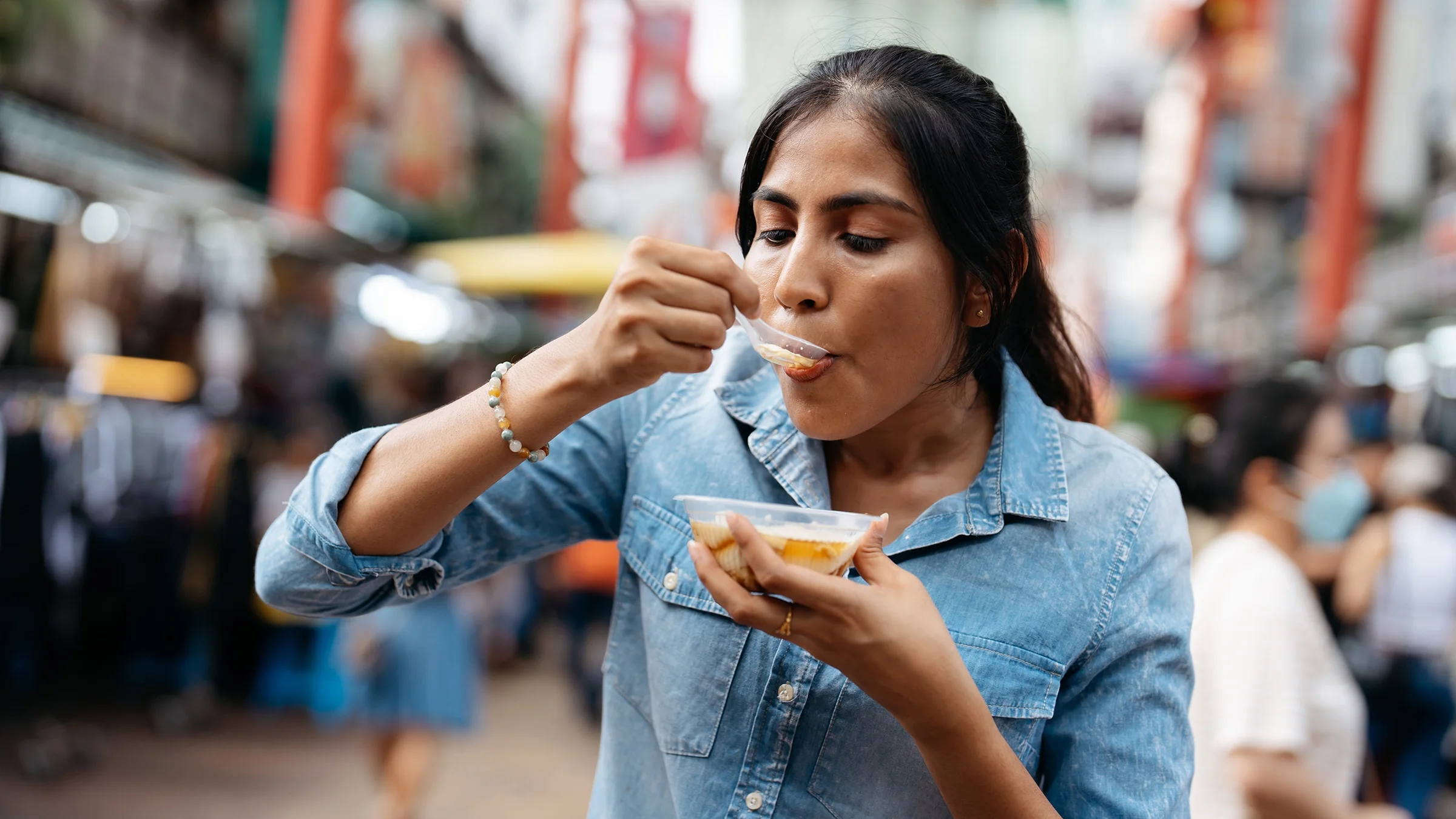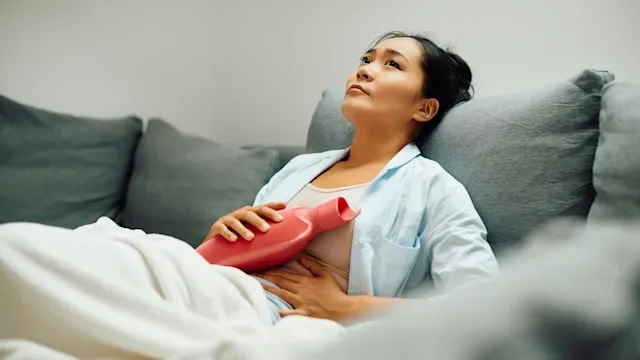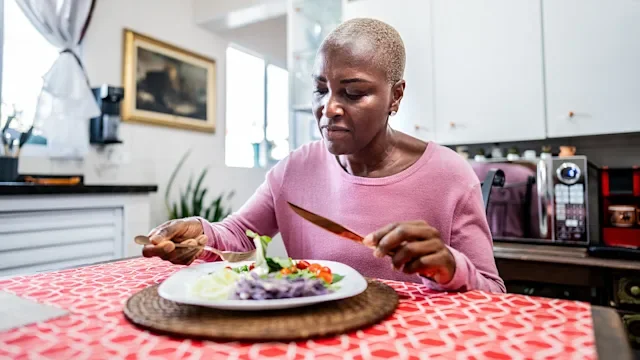Key takeaways:
You may feel hungrier on your period due to changes in levels of certain hormones, like estrogen and progesterone.
Hormonal changes can cause cravings for certain foods like carbs and sweets. This may be your body’s way of preparing to support a potential pregnancy.
If your hunger during your period causes you distress, it may help to practice mindful eating or explore gentle movement. But also know that it’s OK to honor your hunger and cravings.
Your period causes lots of bodily changes — it affects your mood, energy levels, and your appetite. If you find yourself eating more than usual or craving different foods before or during your period, you’re not alone. Many women crave food that has more carbohydrates and sugar before menstruation. Here, we explore why that is, whether it causes weight gain, and ways you can nourish yourself during your period.
How the menstrual cycle affects appetite
It’s common for hormonal changes to affect your appetite throughout your menstrual cycle. Estrogen and progesterone are two of the main hormones that fluctuate. But before we dive into their effect on hunger, let’s look more closely at how they rise and fall.
During your period: Levels of estrogen and progesterone are low.
After your period: Estrogen begins to rise and peaks at ovulation.
Days before your next period: Progesterone rises and peaks. Estrogen has started to decline but is still high.
Estrogen alone decreases a person’s appetite. But progesterone plus estrogen increases hunger. And scientists think you feel hungrier in the days leading up to your period as a way to support a potential pregnancy.
Now let’s take a closer look at some of the research for how this affects different phases of your menstrual cycle:
Before your period: A large review paper and several small studies found that women eat more in the days leading up to their period. Additional research shows that they specifically eat higher amounts of carbs, fat, protein, and sugar.
During your period: Women who experience more severe menstrual pain are more likely to crave processed foods high in sugar, salt, and saturated fats.
After your period: Many of the existing studies find that calorie intake is lower after menstruation.
Some of the research is conflicting, though. And there are several limitations to the studies. It’s difficult to capture individual differences in ovulation, cycle length, symptoms, and food choices. And certain lifestyle factors like physical activity can affect how much energy your body needs and how hungry you feel. Not all of the studies looked at multiple menstrual cycles, either.
So it’s important to remember that every person’s experience is different.
Can your period cause you to gain weight?
It’s natural to experience weight fluctuations throughout your cycle. So yes, your period may cause temporary weight gain. But it’s probably not from what you’re eating. It’s likely because your body naturally holds onto more water when you menstruate.
Foods that help with period cramps: It’s important to honor your cravings during your period. But also incorporating these foods and drinks can help ease period pain.
Are you worried you’re stress eating? There’s a reason your body craves food when you’re stressed. If it’s causing distress for you, these tips can help.
How to get rid of bloating: Many women feel more bloated during their period. Learn what you can do to get rid of bloating fast.
On average, research suggests that women gain about 1 lb of water weight during their period. And often this water retention leads to a feeling of bloating.
Changes in weight during menstruation may also depend on other factors, including:
If your periods are regular
The size of your body
The amount you exercise during your period
If you take oral contraceptive pills
Whether you experience premenstrual syndrome (PMS)
Read more like this
Explore these related articles, suggested for readers like you.
But rest assured that most women return to their baseline weight once their period ends.
Should you eat more food on your period?
There’s a lot of claims and messaging out there about what to eat and how much to eat when you have your period. But everyone is different. It’s most important to listen to your body, and do your best to nourish your hunger.
If you look at the research, it’s unclear whether women should eat more food before or during their period. Some studies show that your body needs and uses more energy before your period. Others argue the increased energy need is small, and that you don’t need to make any significant changes in your diet.
But keep in mind these are research results. They can’t predict what’s best for you and your body.
Managing period hunger and food cravings
It may feel hard to trust your body — especially if you experience significant changes in mental and physical symptoms around your period. But a few of the following tips may help you respond to hunger and food cravings in a way that’s right for you:
Practice mindful eating: A mindful approach to eating can help you get in better touch with your hunger and fullness cues. It starts with observing your thoughts and feelings around food and your body, particularly at mealtime.
Opt for complex carbohydrates: Complex carbohydrates take longer to break down. They help stabilize blood sugar and help you feel full for longer. For example, swap your white rice with brown rice or beans.
Move your body: Gentle, low-impact movement can help during your period. Go for a walk, bike ride, or devote some time to stretching. You may even find that this helps with appetite and food cravings.
Try to reduce stress: Chronic stress may contribute to more frequent food cravings. Consider trying breathing exercises or meditation. Even food journaling may help.
Indulge: Remind yourself it’s OK to eat whatever food makes you feel good. Sometimes cravings mean that your body needs a certain food. And restricting yourself from foods can negatively impact your physical and mental health down the road.
The bottom line
It’s normal to feel hungrier before and during your period. The hormones that fluctuate throughout your menstrual cycle may affect your appetite and food cravings. Do your best not to let it worry or upset you. Most weight gain during your period is temporary, and due to excess water. Listen to your body and honor any hunger cues. If you can, try to eat mindfully, reduce stress, and stay active. And most importantly, let yourself indulge!

Why trust our experts?


References
Beaulieu, K., et al. (2020). The impact of physical activity on food reward: Review and conceptual synthesis of evidence from observational, acute, and chronic exercise training studies. Current Obesity Reports.
Bronzi de Souza, L., et al. (2018). Do food intake and food cravings change during the menstrual cycle of young women? Revista Brasiliera de Ginecologia e Obstetricia.
Chao, A., et al. (2018). Food cravings mediate the relationship between chronic stress and body mass index. Journal of Health and Psychology.
Endikrat, J., et al. (2007). A Canadian multicentre prospective study on the effects of an oral contraceptive containing 3 mg drospirenone and 30 microg ethinyl oestradiol on somatic and psychological symptoms related to water retention and on body weight. European Journal of Contraception and Reproductive Health.
Habib, A., et al. (2023). Unintended consequences of dieting: How restrictive eating habits can harm your health. International Journal of Surgery Open.
Jenkins, D. J. A., et al. (1986). Simple and complex carbohydrates. Nutrition Reviews.
Kanellakis, S., et al. (2023). Changes in body weight and body composition during the menstrual cycle. American Journal of Human Biology.
Ko, K. M., et al. (2017). Association between body weight changes and menstrual irregularity: The Korea National Health and Nutrition examination survey 2010 to 2012. Endocrinology and Metabolism.
Murakami, K., et al. (2008). Dietary glycemic index is associated with decreased premenstrual symptoms in young Japanese women. Nutrition.
Nowak, J., et al. (2020). Food intake changes across the menstrual cycle: A preliminary study. Nursing and Public Health.
Rogan, M. M., et al. (2022). Dietary energy intake across the menstrual cycle: A narrative review. Nutrition Reviews.
Szymanska, K., et al. (2020). Elements of eating pattern and intensity of dysmenorrhea – a cross-sectional study in sample of Polish women. Medical Science Plus.
Tacani, P., et al. (2014). Characterization of symptoms and edema distribution in premenstrual syndrome. International Journal of Women’s Health.
Tucker, J. A. L., et al. (2024). The effect of the menstrual cycle on energy intake: A systematic review and meta-analysis. Nutrition Reviews.
White, C. P., et al. (2011). Fluid retention over the menstrual cycle: 1-year data from the prospective ovulation cohort. Obstetrics and Gynecology International.


















